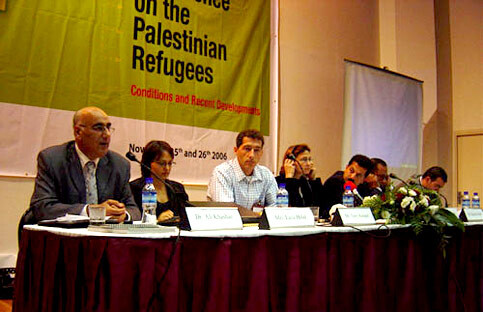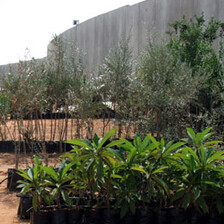The Electronic Intifada 31 January 2007

The panel of participants at “The International Conference on the Palestinian Refugees: Conditions and Recent Developments” (Image: Al-Quds University)
Many conferences have been held in the past few years in both the Palestinian territory and abroad concerning the situation of the Palestinian refugees. The specialists from donor communities, international organizations and those concerned used to call such events “refugee business”. This does not reduce the importance of such a topic at a time when Israel and the Western countries are trying to eliminate such a topic from the table of negotiation, and at a time when the Palestinians are in dire need of not only preparing their file concerning the legal aspects of the return migration and its modalities but also the restitution and the compensation of all Palestinian refugees. The issue of the refugees also became salient because the refugees aren’t anymore the instantiation of “victims” and humanitarian cases, but they are actors of their own fate, resisting with dignity against the occupation and the harsh conditions of their lives in the host countries.
In this framework, Al-Quds University organized the “International Conference on the Palestinian Refugees: Conditions and Recent Developments,” held on the 25th and 26th of November, at the main campus in Abu Dis, Jerusalem. An impressive steering committee was set up, composed of lawyers as well as social and political scientists affiliated to both Palestinian and international universities. I would like to briefly review the content and form of this conference before moving on to explain why Konrad-Adenauer Foundation withdrew their funding.
The conference turned to be a magisterial event mobilizing 30 participants coming not only from West Bank but also from Lebanon, Jordan, Canada, and the UK; scholars as well as experts from UNRWA and other international organizations, activists, and politicians dealing with the refugee files. In addition, the public was also included — around 300 students and refugee community leaders were actively present in this event. It is extremely rare to find such an event organized by research centers located outside of the university in an NGO form to mobilize such a large public. The Palestinian territory was previously accustomed to a kind of workshop gathering where only a selected and very scrupulously “elected” public of 10 to 20 to a maximum of 30 people, usually the same people everywhere, were chosen to take part, a very (self-) illuminating and enlightening elite, part of what I called a “globalized elite”.
Many axes were examined in this conference, ranging from the living conditions of the Palestinian refugees in their camps and elsewhere in Palestinian territory and Arab host countries to the legal dimension (the right of return and its premises in international laws), lessons learnt from repatriation and compensation for other refugees in the world, and finally the prospect of a solution for the Palestinian refugees’ plight. Rich papers and presentations provided theoretical perspectives (the notion of dignity, camps as disciplinary space and territory of exception, etc.) as well as statistics and necessary information required to aid the understanding the current situation and status of the Palestinian refugees. A focus on the problem of the status of the Palestinians in Egypt and the Gazans in Jordan, presented by the researcher Oroub Abed, was particularly crucial to the knowledge of the Palestinian audience in the West Bank. Three papers were remarkable in depicting the status of archives regarding the Palestinian property in 1948 (UNCCP, UNRWA databases) and how to connect that to the oral history of the Palestinian refugees. Lessons learnt from the different international claims commissions were also explored advancing thus the importance to dig in the compensation and restitution file. However, one deplores the lack of sufficient time for discussion — especially when the interaction with the public is salient for a heated topic like the refugees where the public usually does not trust either scholars nor politicians. Lack of communication with the PLO leaders is one of the reasons that were very well explained in the presentation of Karma Nabulsi from Oxford University.
The debate was not easy as the liberal spirit of the conference confronted different opinions. The public witnessed two major surprises. The first come from Dr. Nabil Shaath, former Minister of Foreign Affairs, providing precious little information about the refugee file that was negotiated in all of Camp David, Sharam Sheikh and Taba. Yearning for this kind of information, the public blamed him for the lack of transparency in what went on in the negotiation. He replied that he did not want to reveal his strategy as negotiator to the Israelis who could then read him — words that did not sound convincing at all to the public.
The second surprise came from the presentations of Lex Takkenberg and Anders Fange from UNRWA (the United Nations Relief and Works Agency for Palestine Refugees in the Near East). Both expressed a kind of new discourse of UNRWA that highlights the conditions of Palestinian refugees and the Israeli violations of their rights. Since the UNRWA donor meeting held in Geneva in June 2004, UNRWA had started connecting the service providing mission to the advocacy mission. A rights-based approach to their humanitarian mandate is emerging. As one can notice, relatively strong language is used in UNRWA publications to attract the attention of the International community about the continuous plight of Palestinian refugees is currently being used. However, adopting this approach and enlarging it to take into account the Palestinian refugees’ related rights of housing and those towards children and women does not mean that the right of return has become part of UNRWA advocacy strategy.
This conference, which was very well organized, was supported by the local means of the university as Konrad-Adenauer Stiftung withdrew their funding. In fact, Konrad-Adenauer Stiftung, a German foundation affiliated with the Christian Democratic party (in power), withdrew their funding five weeks before the event, while the organization of the conference began in April 2006. A sudden request from this foundation to the University of Al-Quds to postpone the conference came without any clear arguments. This was the second time this donor requested a delay — the first date of this conference was in September. Those familiar with donors’ jargon know that postponing is a polite and diplomatic way of canceling a project. But requesting the deferral of an international conference one week before it is scheduled to take place is anything but polite — it indicates a total lack of respect and responsibility.
What type of projects does this foundation to do with their Palestinian “receiver” (previous jargon being “partner”)? One can simply go and browse the foundation’s website. Under the theme of civic education, many projects are being done in order to “promote democracy”: however, the concerned democracy is that which gets from the ballot a “docile partner” — not Hamas as the leading political party. Does that mean that their funding aims at the demobilization, de-radicalization, de-politicization of their partner and the society of their intervention?
Scholars like me used to distinguish between international organizations and the local representatives of donor agencies who are often very sensible to the plight of the colonized on the one hand, and the official politics of the government to which such organizations and agencies belong on the other. Since 11 September 2001, the boundaries are very blurred and the grey zone becomes very thick. We are now used to seeing the official German position against the publication or the dissemination of the EU Jerusalem report or the lack of support of EU members towards the International Court of Justice’s advisory opinion regarding the wall, while simultaneously giving the Palestinian NGOs valuable funding to promote Palestinian NGO activities in Jerusalem and to advocate against the Israeli apartheid wall.
The politicization of the (majority of) donor agencies’ agenda is not new. However, what I found exceptionally new is the cynicism of a few of them. Are issues like the apartheid wall, Jerusalem, refugees, the confiscation of IDs and the checkpoints which hinder the movement of the Palestinians not part of their agenda? Are they serious when they conceive programs as if the Palestinians are in a post-conflict society where the promotion the rights of children, women, and people with special needs can be done without supporting the national rights of these very people?
The cynicism, paradoxes and the double standards of some donor agencies have reached its climax — European and North American unlike. I am not surprised by the position of USAID which asked via local directives that its local employees leave any meeting in which a representative of the PNA is present, even if the latter doesn’t officially belong to Hamas. But I am taken aback when I realize the transformation inside the European position. An academic Mediterranean network which is based on a European university has cooperated with a Palestinian economist to produce a certain paper. In September of this year, this network organized an EU-funded workshop and sent him an invitation. One week before the event, he received a letter canceling the invitation, as he is an employee of the Palestinian Central Bureau of Statistics, part of the PNA, for the elected Hamas government is banned by the EU. The EU position reflects a clear deterioration not only of the relative autonomy of the NGO sphere but also the academic world. Currently, both are subject to the state of exception in the name of the security.
Sari Hanafi, who participated in the International Conference on the Palestinian Refugees: Conditions and Recent Developments at Al-Quds University, is a sociologist holding Ph.D. from EHESS-Paris (1994). He is an associate professor in American University of Beirut and former Director of Palestinian Refugee and Diaspora Centre, Shaml. He is the author of numerous journal articles and book chapters on economic sociology and network analysis of the Palestinian diaspora; relationships between diaspora and center; political sociology and sociology of migration (mainly about the Palestinian refugees); sociology of the new actors in international relations (NGOs and international NGOs). Among his books are Here and Their: Toward a deconstruction of the relationship Palestinian Diaspora from Social and Political Perspective, 2001 (In Arabic); Between Two Worlds: Palestinian Businessmen in the Diaspora and the Construction of a Palestinian Entity, three editions, 1997 (in Arabic and in French); La Syrie des ingenieurs. Perspective comparee avec l’Egypte, (1997). He is editing three books on the Arab ONGs (2002; 2004) and Palestinian sociology of return (forthcoming). His last book (with Linda Taber) is The Emergence of Palestinian Globalized Elite. Donors, International organizations and Local NGOs. In English and Arabic, Ramallah: Muwatin and Institute of Jerusalem Studies, 2005.



